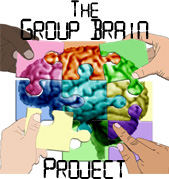
Paul Saffo sends along a note about Harvard's Group Brain project:
" ...The Group Brain Project
Our project is focused on developing a model of how analysis and problem-solving occurs in groups of professionals, and how the complementarities of cognitive processes among team members can affect team performance. A lot of the existing work in the psychology of problem-solving focuses on the cognitions of *individuals*; however, what is less well understood is what takes place when the "analysts" need to confer with one another, share information, and come to a consensus on what the answer is.Brains work effectively only when the various specialized areas operate in concert. And groups work effectively only when they are structured and led in ways that enable them to exploit the complementarities of their members. Given that we can now assess the kinds of cognitive and emotional activities for which different individuals are especially adept, might it be possible to adapt such assessment devices for use in composing teams that perform analytic work? And might it further be possible to identify the specific conditions that would increase the chances that such teams would be able to draw upon the full complement of member talents in the interest of excellent collective performance?
No comments:
Post a Comment